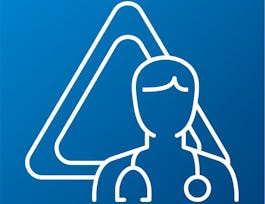Ensuring patient safety and healthcare quality is critical and should be a key focus of everyone in healthcare practice. This course provides healthcare practitioners and others with an introduction to the knowledge and skills needed to lead patient safety and quality improvement initiatives at the micro and macro levels. Participants will explore the foundations of health care quality and the science underlying patient safety and quality improvement, design and select effective health care measures, analyze patient safety problems and processes using tools such as human factors analysis, apply systematic approaches including the Plan-Do-Study-Act (PDSA) model to address quality improvement challenges, and learn strategies to lead a culture of change. The course takes a world view of patient safety and quality, linking participants to research and resources from the World Health Organization (WHO), the US Agency for Healthcare Research and Quality (AHRQ), the Joint Commission and other international organizations. Course highlights include personal stories, lessons learned from other industries and interviews with the President of the National Committee for Quality Assurance (NCQA) and other leaders in quality movement.

New year. Big goals. Bigger savings. Unlock a year of unlimited access to learning with Coursera Plus for $199. Save now.


Leading Healthcare Quality and Safety


Instructors: Gregory Pawlson
58,890 already enrolled
Included with 
(1,372 reviews)
Details to know

Add to your LinkedIn profile
5 assignments
See how employees at top companies are mastering in-demand skills


Earn a career certificate
Add this credential to your LinkedIn profile, resume, or CV
Share it on social media and in your performance review

There are 5 modules in this course
Welcome to Module 1! During this module, you'll learn about the current state of healthcare quality and safety in the US and globally, and the essential characteristics and expected outcomes of safe, high-quality healthcare. We'll also discuss the core elements of quality improvement, and the data needed to assess the safety and quality of care. Finally, we'll examine lessons learned from other industries & disciplines that can be applied to healthcare improvement efforts. We're looking forward to getting started!
What's included
5 videos2 readings1 assignment3 discussion prompts
Welcome to Module 2! This week, we examine the criticality of patient safety to healthcare and the sciences underlying patient safety. You'll learn a model for systems engineering and a process for anticipating and addressing medical errors. You'll also learn about the importance of a just culture approach to medical error prevention.
What's included
6 videos1 reading1 assignment2 discussion prompts
Welcome to Module 3! This week we delve into measures and measurement. You'll learn to apply the basic Donebedian framework for measuring quality in healthcare in terms of structure, process and outcomes. We'll discuss the key attributes of useful (good) healthcare measures and the core concepts of validity and reliability. You'll also learn the most critical elements to consider in choosing and applying a measure or measures to measurement in a given health care setting or situation, and the key characteristics of a measurement process that must be present to provide information that is a valid and useful reflection of quality of care.
What's included
6 videos2 readings1 assignment2 discussion prompts
Welcome to Module 4! This week you'll learn how to identify quality improvement opportunities and apply the PDSA cycle to address them. We'll also discuss the importance and benefits of team-based approaches to quality improvement, and the value of Health Information Technologies (HIT) and other innovations in improving health care quality.
What's included
6 videos1 reading1 assignment1 peer review2 discussion prompts
Welcome to Module 5! This week we explore the importance of leadership in supporting and advancing quality and safety at all levels of the healthcare organization. We'll discuss strategies that contribute to a quality culture in health care, and examine different models of organizational change that you can apply as you lead your own quality and safety initiatives.
What's included
6 videos1 reading1 assignment2 discussion prompts
Instructors


Offered by
Recommended if you're interested in Healthcare Management

Northeastern University
Northwestern University

Imperial College London
Why people choose Coursera for their career




Learner reviews
1,372 reviews
- 5 stars
79.43%
- 4 stars
17.95%
- 3 stars
1.96%
- 2 stars
0.43%
- 1 star
0.21%
Showing 3 of 1372
Reviewed on Dec 15, 2019
how to be an effective leader was quite important for me. the questions really fit to me as i have joined a new job as quality manager and have found myself struggling to create safety culture.
Reviewed on Jul 31, 2017
This course give me insight of how to handle hospital quality assurance better in order to improve the hospital performance both from top-down and bottom-up way of management.
Reviewed on Nov 16, 2020
Thank you for this program. Both instructors were very engaging and offered a wealth of information. I gave it 4 stars only because some links in the required reading had expired.
New to Healthcare Management? Start here.

Open new doors with Coursera Plus
Unlimited access to 10,000+ world-class courses, hands-on projects, and job-ready certificate programs - all included in your subscription
Advance your career with an online degree
Earn a degree from world-class universities - 100% online
Join over 3,400 global companies that choose Coursera for Business
Upskill your employees to excel in the digital economy
Frequently asked questions
This continuing nursing education activity has been approved by the Maryland Nurses Association, an accredited approver by the American Nurses Credentialing Center’s Commission on Accreditation. Nursing CE Contact Hours: 10.5.
Healthcare professionals interested in earning the Nursing CE contact hours must:
1) Enroll in the course and purchase the $49 Coursera Certificate option
2) Register for the Nursing CE contact hours through the George Washington University School of Nursing via the link below. There is an additional non-refundable fee of $60.
3) Successfully complete the course. This requires completion of all modules, reading of all required materials, and a passing score of 80% or higher on all quizzes.
Register for Nursing CE: http://conta.cc/2uePVXA
Access to lectures and assignments depends on your type of enrollment. If you take a course in audit mode, you will be able to see most course materials for free. To access graded assignments and to earn a Certificate, you will need to purchase the Certificate experience, during or after your audit. If you don't see the audit option:
The course may not offer an audit option. You can try a Free Trial instead, or apply for Financial Aid.
The course may offer 'Full Course, No Certificate' instead. This option lets you see all course materials, submit required assessments, and get a final grade. This also means that you will not be able to purchase a Certificate experience.
When you purchase a Certificate you get access to all course materials, including graded assignments. Upon completing the course, your electronic Certificate will be added to your Accomplishments page - from there, you can print your Certificate or add it to your LinkedIn profile. If you only want to read and view the course content, you can audit the course for free.



